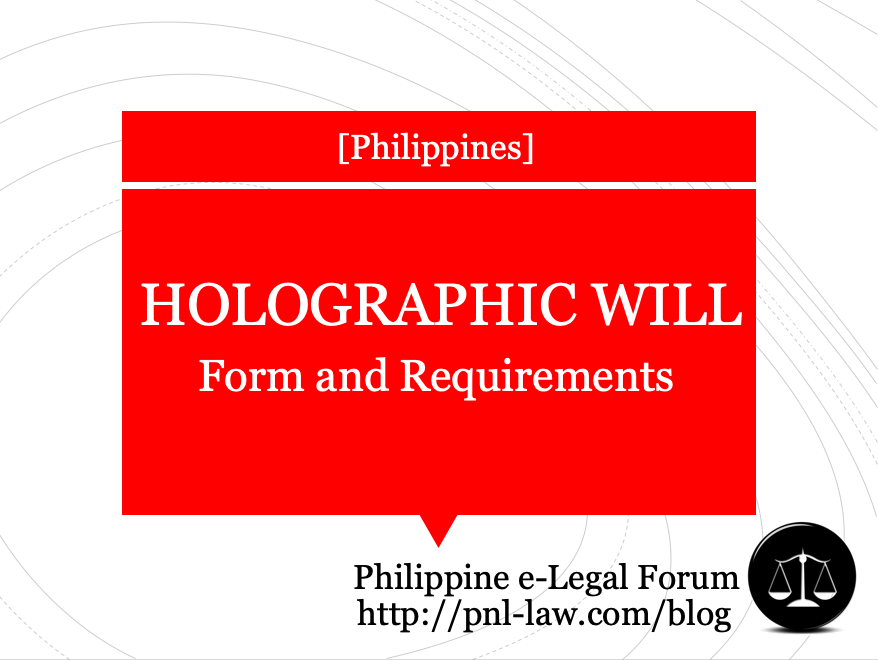A holographic will is one which is entirely written, dated, and signed by the hand of the testator himself/herself. The only requirements for the validity, and probate, of a holographic will are those contained in Article 810 of the Civil Code, which reads in full: “A person may execute a holographic will which must be entirely written, dated, and signed by the hand of the testator himself. It is subject to no other form, and may be made in or out of the Philippines, and need not be witnessed.”

In other words, the validity of a holographic will is not subject to any form or requirement, other than the requirement that it is “entirely written, dated, and signed by the hand of the testator himself”. The preparation of a holographic will need not be witnessed. It need not be notarized or signed in each and every page thereof. It may be executed in or outside the Philippines. [See Form and Requirements of Notarial Wills]
As to specific dispositions in a holographic will, there are requirements:
- The dispositions written below the signature must be dated and signed by the testator in order to make them valid as testamentary dispositions (Civil Code, Article 812).
- When a number of dispositions appearing in a holographic will are signed without being dated, and the last disposition has a signature and a date, such date validates the dispositions preceding it, whatever be the time of prior dispositions (Civil Code, Article 813).
- In case of any insertion, cancellation, erasure or alteration in a holographic will, the testator must authenticate the same by his full signature (Civil Code, Article 814)
Nevertheless, these requirements affect the validity of the dispositions contained in the holographic will, but not its validity and probate. For instance, if the testator fails to sign and date some of the dispositions, the result is that these dispositions cannot be effectuated, but it does not render the whole testament void.
PROBATE OF HOLOGRAPHIC WILL
No will shall pass either real or personal property unless it is proved and allowed in accordance with the Rules of Court (Civil Code, Article 838). In other words, the presentation of the will for probate is mandatory.
To probate a will means to prove before some officer or tribunal, vested by law with authority for that purpose, that the instrument offered to be proved is the last will and testament of the deceased person whose testamentary act it is alleged to be, and that it has been executed, attested and published as required by law, and that the testator was of sound and disposing mind. It is a proceeding to establish the validity of the will.
The validity of the will is different from the requirements for its probate. In the probate of a holographic will, it shall be necessary that at least one witness who knows the handwriting and signature of the testator explicitly declare that the will and the signature are in the handwriting of the testator. If the will is contested, at least three of such witnesses shall be required. In the absence of any competent witness referred to in the preceding paragraph, and if the court deem it necessary, expert testimony may be resorted to. [Civil Code, Article 811]
In a petition to admit a holographic will to probate, the only issues to be resolved are:
- (1) whether the instrument submitted is, indeed, the decedent’s last will and testament;
- (2) whether said will was executed in accordance with the formalities prescribed by law;
- (3) whether the decedent had the necessary testamentary capacity at the time the will was executed; and,
- (4) whether the execution of the will and its signing were the voluntary acts of the decedent.
The law presumes that every person is of sound mind, in the absence of proof to the contrary (Civil Code, Article 800). Forgetfulness is not equivalent to being of unsound mind. To be of sound mind, it shall be sufficient if the testator was able at the time of making the will to know the nature of the estate to be disposed of, the proper objects of his bounty, and the character of the testamentary act (Civil Code, Article 799).
The burden of proof that the testator was not of sound mind at the time of making his dispositions is on the person who opposes the probate of the will.
[See also: Basic Discussion on Last Will and Testament; Sources/Quotes: Heirs of Lasam vs. Umengan, G.R. No. 168156, 6 December 2006, citing Tolentino; Spouses Ajero vs. CA, G.R. No. 106720, 15 September 1994; Baltazar vs. Laxa, G.R. No. 174489, 11 April 2012]
- Extension of Filing Periods and Suspension of Hearings for March 29 to April 4, 2021: SC Administrative Circular No. 14-2021 (Full Text) - March 28, 2021
- ECQ Bubble for NCR, Bulacan, Cavite, Laguna and Rizal: Resolution No. 106-A (Full Text) - March 27, 2021
- Guidelines on the Administration of COVID-19 Vaccines in the Workplaces (Labor Advisory No. 3) - March 12, 2021

Greetings,
There are (2) set of Will that was excuted.,Are both of this will valid. The Date and years are about(3) years.And the individual who made the holographic will ,Was I’ll. With a cardiac problem and was under medication upon the second will was made.
Question po. After the death of the testator, is there an expiration of the holographic will. An actual example is my sister claims that she has in her possession a holographic will of our mother but until now she’s not submitting it to court for probate. Our mother died 2 years ago to be exact. Is the holographic will that my sister is holding still valid? The will she’s holding says that she is inheriting the whole house of our parents. I will greatly appreciate your reply. Thank you.
wala po expiration yan